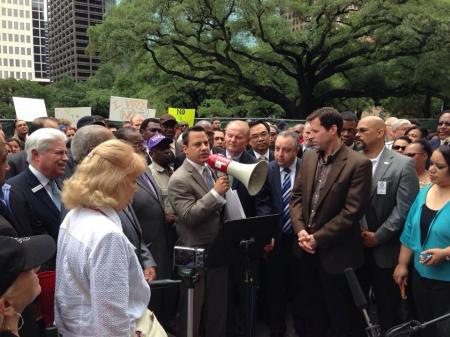Could This US Supreme Court Decision Determine Outcome of Houston's 'Bathroom Bill' Petition Suit?

A 1999 U.S. Supreme Court decision could play a role in the outcome of a lawsuit over Houston Mayor Annise Parker's denial of a petition to revoke the city's new Equal Rights Ordinance.
Around 55,000 signatures were gathered to add to the November ballot a question on whether to repeal the ERO. Since "gender identity" is included in the list of categories that cannot be discriminated against for public accommodations, critics have dubbed the law the "bathroom bill," because males who identify as female would be allowed to use women's bathrooms and females who identify as male would be allowed to use men's bathrooms.
Even though the city secretary, Anna Russell, certified the signatures, Parker refused to add the issue to next week's ballot, arguing that most of the signatures were invalid.
In a Wednesday interview with The Christian Post, Andy Taylor, lead counsel for the plaintiffs who sued the city for denying the petition, claimed that the signatures were wrongly invalidated, and Parker did not have the authority in the first place to deny a petition that had been validated by the city secretary.
According to Taylor, after Russell, who has served as city secretary for 42 years, validated more than enough signatures for the petition to be added to the ballot (17,269 are required), Parker and city attorney David Feldman wrote a one paragraph memo claiming that a large number of signatures were invalid for three reasons: 1) Some signatures were not legible. 2) Some of the circulators, those who collect the signatures, had not signed the petition. 3) Some of the circulators were not registered voters.
Regarding the first reason, Taylor said no law states that signatures must be legible. The intent of a signature is to identify a mark that is unique to an individual, not to be legible. Parker and Feldman even claimed that the signature of a Houston City Council member was invalid because he signed his name with his nickname rather than the name on his birth certificate, Taylor added.
Regarding the second reason, Taylor said it is not true that some circulators did not sign the petition. A circulator can gather many pages of petitions, but they can only sign the petition once. Rather than looking to find which page a circulator signed the petition, Parker and Feldman claimed that any of the pages that did not include the circulator's signature as a petition signer were invalid. If the circulators signed the petition for every page for which they gathered signatures, however, they would have signed the petition more than once, which is against the law.
The second and third reasons that Parker and Feldman invalidated signatures go hand-in-hand. Under Houston law, the circulator must sign the petition and to sign the petition the circulator must be a registered voter. Taylor argued that Parker and Feldman were wrong to claim that some circulators were not registered voters. But even if they were correct, Taylor said his fallback position is that the Houston law requiring circulators to sign the petition, and by default to be registered voters, is unconstitutional.
In Buckley vs. American Constitutional Law Foundation Inc. (1999), the U.S. Supreme Court said it is a violation of the First Amendment to require that petition circulators be registered voters.
The case dealt with a Colorado law requiring that circulators, among other things, be registered voters. The Supreme Court struck down the law, arguing that it produced a "speech diminution" because it limited the number of voices for petition proponents.
"Beyond question, Colorado's registration requirement drastically reduces the number of persons, both volunteer and paid, available to circulate petitions," Justice Ruth Bader Ginsburg wrote for the 6-3 majority.
Another issue in the Houston case is whether the mayor even had the authority to invalidate the petition signatures and not place the question on the ballot.
In a deposition to Taylor, Russell said she attached the memo, as instructed by Parker, to the petition, but she did not invalidate the signatures. Russell still believes the signatures are valid. Parker and Feldman claim that the memo gives them the legal authority to not place the petition on the ballot. According to Taylor, the Houston city charter only gives the authority to invalidate signatures to the city secretary.
Taylor also represents five pastors who were subpoenaed by the city in the case. Those subpoenas were widely criticized and brought national attention to this case. On Wednesday, Parker announced she dropped the subpoenas.
The case will go to trial in January. According to Taylor's understanding of the Houston city charter, if his plaintiffs win the case, the Equal Rights Ordinance will be suspended, the Houston City Council will vote on whether to repeal the ordinance, and if the council does not repeal it the question will go on the ballot in the November 2015 election.






















